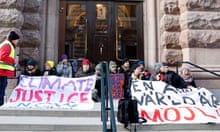The climate activist Greta Thunberg has arrived in Lisbon after a three-week catamaran voyage across the Atlantic Ocean from the US.
The Swedish teenager now plans to head to Spain to attend the UN climate conference in Madrid.
TimelineHalf a century of dither and denial – a climate crisis timeline
Show
Fossil fuel companies have been aware of their impact on the planet since at least the 1950s
The physicist Edward Teller tells the American Petroleum Institute (API) a 10% increase in CO2 will be sufficient to melt the icecap and submerge New York. “I think that this chemical contamination is more serious than most people tend to believe.”
Lyndon Johnson’s President’s Science Advisory Committee states that “pollutants have altered on a global scale the carbon dioxide content of the air”, with effects that “could be deleterious from the point of view of human beings”. Summarising the findings, the head of the API warned the industry: “Time is running out.”
Shell and BP begin funding scientific research in Britain this decade to examine climate impacts from greenhouse gases.
A recently filed lawsuit claims Exxon scientists told management in 1977 there was an “overwhelming” consensus that fossil fuels were responsible for atmospheric carbon dioxide increases.
An internal Exxon memo warns “it is distinctly possible” that CO2 emissions from the company’s 50-year plan “will later produce effects which will indeed be catastrophic (at least for a substantial fraction of the Earth’s population)”.
The Nasa scientist James Hansen testifies to the US Senate that “the greenhouse effect has been detected, and it is changing our climate now”. In the US presidential campaign, George Bush Sr says: “Those who think we are powerless to do anything about the greenhouse effect forget about the White House effect … As president, I intend to do something about it.”
A confidential report prepared for Shell’s environmental conservation committee finds CO2 could raise temperatures by 1C to 2C over the next 40 years with changes that may be “the greatest in recorded history”. It urges rapid action by the energy industry. “By the time the global warming becomes detectable it could be too late to take effective countermeasures to reduce the effects or even stabilise the situation,” it states.
Exxon, Shell, BP and other fossil fuel companies establish the Global Climate Coalition (GCC), a lobbying group that challenges the science on global warming and delays action to reduce emissions.
Exxon funds two researchers, Dr Fred Seitz and Dr Fred Singer, who dispute the mainstream consensus on climate science. Seitz and Singer were previously paid by the tobacco industry and questioned the hazards of smoking. Singer, who has denied being on the payroll of the tobacco or energy industry, has said his financial relationships do not influence his research.
Shell’s public information film Climate of Concern acknowledges there is a “possibility of change faster than at any time since the end of the ice age, change too fast, perhaps, for life to adapt without severe dislocation”.
At the Rio Earth summit, countries sign up to the world’s first international agreement to stabilise greenhouse gases and prevent dangerous manmade interference with the climate system. This establishes the UN framework convention on climate change. Bush Sr says: “The US fully intends to be the pre-eminent world leader in protecting the global environment.”
Two month’s before the Kyoto climate conference, Mobil (later merged with Exxon) takes out an ad in The New York Times titled Reset the Alarm, which says: “Let’s face it: the science of climate change is too uncertain to mandate a plan of action that could plunge economies into turmoil.”
The US refuses to ratify the Kyoto protocol after intense opposition from oil companies and the GCC.
The US senator Jim Inhofe, whose main donors are in the oil and gas industry, leads the “Climategate” misinformation attack on scientists on the opening day of the crucial UN climate conference in Copenhagen, which ends in disarray.
A study by Richard Heede, published in the journal Climatic Change, reveals 90 companies are responsible for producing two-thirds of the carbon that has entered the atmosphere since the start of the industrial age in the mid-18th century.
The API removes a claim on its website that the human contribution to climate change is “uncertain”, after an outcry.
Exxon, Chevron and BP each donate at least $500,000 for the inauguration of Donald Trump as president.
Mohammed Barkindo, secretary general of Opec, which represents Saudi Arabia, Kuwait, Algeria, Iran and several other oil states, says climate campaigners are the biggest threat to the industry and claims they are misleading the public with unscientific warnings about global warming.
Thunberg hitched a ride from the US with an Australian family on their 48-ft (15-metre) yacht.
The white catamaran carrying Thunberg sailed slowly up the River Tagus under blue skies and a stiff breeze. Thunberg’s father, Svante, was also on the boat as it approached the Lisbon quayside.
Chile’s environment minister, Carolina Schmidt, saluted Thunberg’s role in speaking out about the threat of climate breakdown.
“She has been a leader that has been able to move and open hearts for many young people and many people all over the world,” Schmidt said at the summit in Madrid. “We need that tremendous force in order to increase climate action,.”
Thunberg was due to be met in Lisbon by local dignitaries and other activists. Her representatives said they could not confirm when she would travel to the Spanish capital.
Q&AWhich countries contribute most to the climate crisis?
Show
China produces the most heat-trapping pollution, followed by the US. But historically, the US has contributed more carbon dioxide to the atmosphere than any other nation. The US also has high emissions per capita, compared to other developed countries. And Americans buy products made in China, therefore supporting China's carbon footprint.
She wanted a low-carbon form of transport to get to the climate meeting, which was switched at short notice to Spain from Chile due to unrest there. The yacht, named La Vagabonde, leaves little or no carbon footprint when its sails are up, using solar panels and hydro-generators for electricity.
Meanwhile, a report by the UN weather agency released on the sidelines of the climate talks has found that this decade is likely to set a 10-year temperature record.
Preliminary measurements show the years 201519 and 2010-19 “are, respectively, almost certain to be the warmest five-year period and decade on record”, the World Meteorological Organization said. “Since the 1980s, each successive decade has been warmer than the last.”
Quick GuideThe Guardian's environmental pledge 2019
Show
We believe that the escalating climate crisis is the defining issue of our lifetimes and that the planet is in the grip of an emergency. We know that our readers and supporters around the world care passionately about this too, as so many of you have told us.
We want the Guardian to play a leading role in reporting on the environmental catastrophe. So at the Guardian we commit to the following:
- We will continue our longstanding record of powerful environmental reporting, which is known around the world for its quality and independence.
- We will report on how environmental collapse is already affecting people around the world, including during natural disasters and extreme weather events.
- We will use language that recognises the severity of the crisis we’re in.
- The Guardian will achieve net zero emissions by 2030.
- We will be transparent with our progress.
While full-year figures would not be released until March, 2019 was also expected to be the second or third warmest year since measurements began, with 2016 still holding the all-time temperature record, it said.









